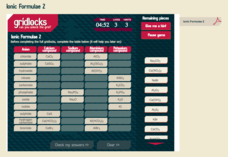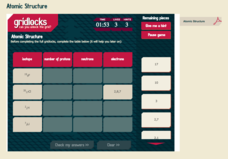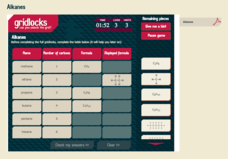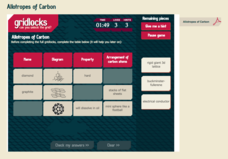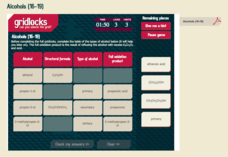Logic Teacher Resources
Hi, What do you want to do?
Find Logic lesson plans and worksheets
Showing 4,728 resources
Macat
An Introduction to Jared Diamond's Guns, Germs, and Steel
Could geography really be the most logical explanation for the success rate of any given population? Jared Diamond makes his anthropological contention in his 1997 publication Guns, Germs, and Steel. A short explores his main points and...
MinutePhysics
How Far Can Legolas See?
Legolas counts the number of riders on steeds at a distance of five leagues away, including knowing their colors and height, in J.R.R. Tolkien's Lord of the Rings. A video researches this possibility by starting with the...
Consortium for Ocean Leadership
Measure for Measure
How does your class measure up? Young scientists create a scale drawing of the JOIDES Resolution in a collaborative activity. The lesson incorporates mathematical principles with deep-sea exploration to focus on enhancing measurement...
Royal Society of Chemistry
Acids
She threw sodium chloride at me—that's a salt! Scholars match acids to their formulas as well as their salt compounds. Completing a series of three gridlock puzzles reinforces each of the matches in a logical manner.
Royal Society of Chemistry
Crude Oil
The United States consumes more oil than any other country, and its residents use 50 percent of that for transportation. Scholars match eight fractions of crude oil to their applications. Then, they fill in three logic puzzles reviewing...
Royal Society of Chemistry
Ionic Formulae 2
Scientists call ions with a negative charge anions. Scholars work through one matching puzzle and four logic puzzles reviewing the chemical formulas for anion ions. Each level increases in difficulty and solidifies the concept in pupils'...
Royal Society of Chemistry
Hydroxide Precipitates
When two liquids combine and a solid forms, the new substance is called a precipitate. Scholars test their knowledge of hydroxide precipitates and their properties. A series of four increasingly difficult puzzles challenge their logic...
Royal Society of Chemistry
Esters from Alcohols and Acids
Fats and oils often contain esters, which sometimes find their way into perfumes due to their pleasant smells. Scholars match the name of esters made from four different types of alcohol and four different types of carboxylic acids....
Royal Society of Chemistry
Atomic Structure
Changing the number of neutrons in an atom makes it an isotope, but it does not change the element. Pupils complete logic puzzles, matching isotopes with their unique number of protons, neutrons, and electrons. Either on paper or timed...
Royal Society of Chemistry
Alkanes
Alkanes contain only single bonds and have no functional groups. Scholars match the properties of six alkanes in a series of four puzzles. Problem solving and logic help cement the concepts with repetition.
Royal Society of Chemistry
Allotropes of Carbon
Carbon takes on many forms including diamond, graphite, and buckminsterfullerene. Scholars review their knowledge of these three allotropes of carbon as they complete four puzzles. The first acts as a general review, and the other three...
Royal Society of Chemistry
Ionic Formulae 1
The ionic formula for banana would be BaNa2. Scholars work their way through four puzzles reviewing ionic formulas. Each puzzle requires scientific knowledge as well as logic and problem-solving skills.
Royal Society of Chemistry
Alcohols (16-19)
Propanol is a common alcohol used in hand sanitizers. The many forms and uses of alcohols fill an intriguing lesson. Scholars apply logic to match alcohols, chemical structural formulas, oxidation products, and more in a series of puzzles.
Royal Society of Chemistry
Types of Bonding
A covalent bond yells at an ionic bond, "Didn't anyone teach you to share?" Four matching puzzles allow pupils to review covalent, ionic, and metallic bonding. They apply logic and problem solving to complete gridlocks including the...
Western Education
Math Poems
The logic, rhythm, and beauty of math sometimes get lost amidst numbers and variables. Amplify math's lyricism with a poetry project that uses metaphors and similes to compare mathematical concepts to other images.
CCSS Math Activities
Smarter Balanced Sample Items: High School Math – Claim 3
Communication is the key. A presentation provides 25 sample items for Claim 3, Communicating Reasoning, for the Smarter Balanced High School Math assessment. Items require pupils to answer the question and provide logical reasoning to...
ConnectED
Crime Scene Investigation
How exactly does a crime scene investigation work? The resource, a unit on criminology, covers everything from the deductive reasoning skills needed for detectives to DNA fingerprinting, all the way to how to gather evidence and bring...
TED-Ed
Can You Spot the Problem with These Headlines? (Level 1)
What's the story behind the headlines for scientifically researched products? Viewers of a short video identify the fallacies in headlines designed to lure the unwary.
EngageNY
Grade 10 ELA Module 4, Unit 2, Lesson 23a
What is the best way to present information concisely and logically? Using an informative resource, scholars review the criteria for a successful presentation. They share their arguments about which character from Shakespeare's Macbeth...
EngageNY
Organizing an Opinion, Reasons, and Evidence: Text 1 for Each Expert Group
Working in small groups, scholars continue reading an informational text about either Roberto Clemente or Althea Gibson. As they read, pupils create graphic organizers in their journals to help map their ideas logically.
Crash Course
The Central Processing Unit (CPU): Crash Course Computer Science #7
Build your own CPU. A video shows how logic gates, the ALU, and RAM all combine to form the central processing unit of a computer. It explains the fetch, decode, and execute phases of the CPU.
Khan Academy
Organic Chemistry Naming Examples 4, Organic Chemistry
Sal continues to work through examples of more complicated carbon chains. He presents a complicated name and attempts to work through it logically, drawing the structure. His humor makes these strategies fun and easy to watch.
Khan Academy
Naming Alkanes with Alkyl Groups, Organic Chemistry
Sal continues to work through examples of naming carbon chains. He is very clear and logical, so your class should understand this clearly. The video introduces branching and identifying where the additional group is located. Note: A...
Curated OER
New York State Testing Program: English Language Arts Book 2
Practice listening and writing skills with this resource. This is a test created by the New York State Testing Program. Learners listen to a passage called "Leonardo da Vinci's Mona Lisa" twice and write responses to the selection. They...
Other popular searches
- Logic Puzzles
- Logic Problems
- Logical Reasoning
- Logical Sequence
- Logical Thinking
- Logical Order
- Logical Fallacies
- Reasoning Skills
- Boolean Logic
- Hydro Logic Cycle
- Logic Riddles
- Math Logic





